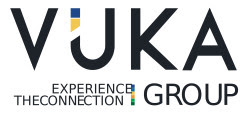- Details
- East Africa
- 500
The festival promises to be a transformative celebration of leadership, wellness, collaboration, and personal empowerment - highlighting stories of women who defy conventions, break barriers and inspire collective impact
Following a massively successful inaugural event, Good Hope FM’s ‘Warrior Woman Awards’ will be joining forces with the phenomenal WomenIN Festival 2025, delivering the biggest celebration of women that the Mother City has ever seen and rocking Cape Town on 13 to 14 November at Newlands Cricket Ground.
The ‘Warrior Woman Awards’, championed by Good Hope FM’s ‘The Morning Show’ with Leigh-Anne Williams, Sandra Rosenberg and Delucia Daniels, is a prestigious annual event that recognises and celebrates South African women from all walks of life - women who have achieved greatness through making a positive impact and inspiring everyone around them. The awards feature nominees across 10 power punch categories: Excellence in Leadership, Media & Communications, Social Impact Champion, Education & Research, Arts & Entertainment, Pioneer in STEM (Science, Technology, Engineering, Mathematics), Business & Entrepreneurship, Healthcare & Wellness, Unsung Shero and Young Achiever.
This year, the Good Hope FM ‘Warrior Woman Awards’ will be taking place at the culmination of the WomenIN Festival 2025, which is set to make a bold statement with a “LIMITLESS. No Labels. No Limits. No Apologies” theme.
Here, women who stand out, show up, and shake the world, will come together in their hundreds for an unforgettable two-day experience, featuring over 60 powerhouse speakers and impactful female voices from 17+ different industries. The festival promises to be a transformative celebration of leadership, wellness, collaboration, and personal empowerment - highlighting stories of women who defy conventions, break barriers and inspire collective impact.
Day 1: UNAPOLOGETICALLY HER - Owning Your Brilliance. Breaking the Mold. Casting the spotlight on women unapologetically embracing their power and redefining leadership on their own terms and featuring trailblazing women such as:
- Honourable Bridgette Motsepe-Radebe in an intimate fireside chat
- President Zingiswa Losi on Power Without Permission: Redefining Leadership, Labour, and Legacy
- Thando Hopa with Unapologetically Bold: Redefining Possibility and many more trailblazer’s
Sessions and masterclasses will cover various engaging topics:
- Leading Without Permission – reshaping leadership across mining, mobility, energy, tech, and CX
- Money, Power, Freedom – financial literacy, negotiating your worth, and wealth-building
- The Wellness Revolution – addressing burnout, boundaries, mental health, and holistic self-care
- She Builds – lessons from women entrepreneurs on funding, failing, and flourishing
- Unboxed – creatives breaking labels and embracing authentic expression
- Designing a Limitless Life – vision mapping and values-driven goal setting
Day 2: UNSTOPPABLE US - Collective Strength. Radical Collaboration.
Celebrating the power of women together, emphasizing mentorship, solidarity, and collaboration across sectors:
- Sisterhood is a Strategy – mentorship, intergenerational collaboration, and community building
- Motherhood Meets Mission – balancing parenthood, career, and purpose
- Shaping the Future of Women’s Football – inclusive pathways and leadership
- Women, AI & Empowerment – smashing ceilings in STEM and tech
- The Queen Syndrome – fostering solidarity, overcoming rivalry
- GBV Sessions & Self-Defence Class – in partnership with MOSAIC, Women For Change, and Fight Back SA
- The official Good Hope FM Warrior Woman Awards ceremony
The day will also feature practical masterclasses, wellness activations, sector-specific panels, and exciting empowering announcements to be unveiled live at the festival.
In the build-up to the 2025 WomenIN Festival and Warrior Woman Awards, Good Hope FM’s Leigh-Anne Williams, who has championed telling the stories of remarkable women across various platforms for many years, will be showcasing the amazing 2024 Warrior Woman winners and what they are currently up to, as well as interviewing other passionate, standout women who are making a powerful impression and leaving a lasting legacy.
Good Hope FM and 5FM Business Manager, Masi Mdingane, says, “With Good Hope FM’s Warrior Woman Awards not in its 2nd year and firmly established as a platform for impactful women from all walks of life to not only receive the recognition they deserve, but also step into their full potential, it is an amazing honour and privilege for us to join forces with WomenIN. With this move, Warrior Woman remains true to its core – not only being a glitzy awards and celebration evening for Cape Town’s most impactful women, but networking, enabling and empowering the next wave of fabulous and formidable femme fortitude to change not only the Mother City, but our whole nation and the globe for the better.”
Nazlee Fredericks Maharaj, Portfolio Director for WomenIN, and a winner of the 2024 Warrior Woman Empowerment Advocate Award, says, "WomenIN Festival is not just an event, it’s a movement. It’s about dismantling labels, rejecting limits, and unapologetically stepping into our brilliance while holding space for others to do the same. This year’s program equips women with both practical skills and soft power tools, to thrive in their careers and live fully, well, and limitlessly."
For the Warrior Woman Awards, get all the need-to-know info on how to nominate your favourite leading ladies by staying tuned to Good Hope FM, following us on all social media, downloading the Good Hope FM App, or visiting www.GoodHopeFM.co.za. You can also get all of Good Hope FM and the SABC’s best content by heading on over to SABC PLUS (https://SABC-PLUS.com/).
To book your ticket and empowerment pass for WomenIN 2025, which includes full access to all keynotes, panels, fireside chats, masterclasses, wellness and self-defence sessions, networking opportunities with leaders across industries and the Good Hope FM Warrior Woman Awards, you can Visit www.GoodHopeFM.co.za or www.WeAreWomenIN.com Distributed by APO Group on behalf of VUKA Group.






